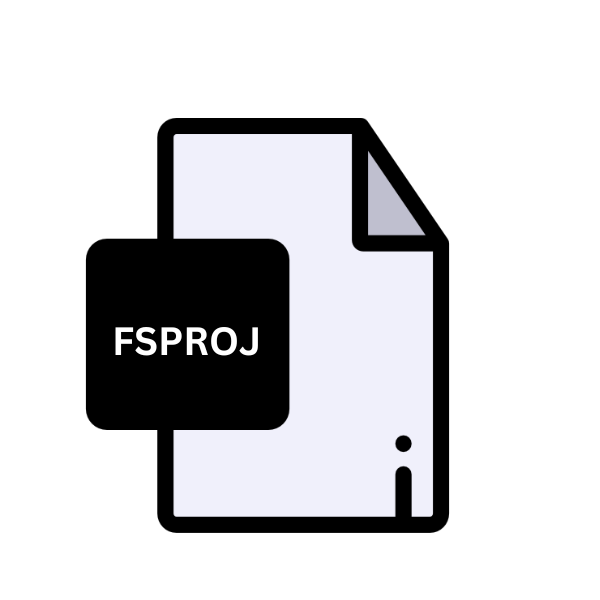.FSPROJ File Extension

Visual F# Project File
| Developer | Microsoft |
| Popularity | |
| Category | Developer Files |
| Format | .FSPROJ |
| Cross Platform | Update Soon |
What is an FSPROJ file?
The .FSPROJ file extension holds significance as it represents Visual F# Project Files. These files play a crucial role in the organization and management of F# projects within the Visual Studio environment.
In this detailed exploration, we delve into the origins, structure, advantages, and conversion methods associated with .FSPROJ files, catering to developers seeking a deeper understanding of this essential component of F# development.
More Information.
The inception of .FSPROJ files coincide with the emergence of F# as a prominent member of the .NET programming family. Initially introduced as part of Visual Studio 2005, F# gained traction among developers due to its succinct syntax, strong typing, and support for functional programming paradigms.
The .FSPROJ file format was designed to provide a standardized means of defining F# projects, facilitating seamless integration with Visual Studio’s project management tools.
Origin Of This File.
The .FSPROJ file extension traces its roots back to the development ecosystem of Microsoft’s .NET framework, specifically within the domain of F# programming language.
F# is a functional-first programming language that seamlessly integrates with the .NET framework, offering a powerful toolset for developing robust, scalable applications.
.FSPROJ files serve as the backbone for organizing F# projects, encapsulating configuration settings, references, and build instructions necessary for project compilation and execution.
File Structure Technical Specification.
At its core, the .FSPROJ file is an XML-based document that adheres to a specific schema defined by Visual Studio. The file encapsulates various elements essential for project configuration, including but not limited to:
- Project settings: Defines project-specific configurations such as target framework version, output type, and assembly name.
- References: Specifies dependencies on external libraries, assemblies, or other projects.
- Source files: Lists the F# source files comprising the project, along with their relative paths within the project directory.
- Build instructions: Includes directives for compiling, linking, and packaging project components into executable or library artifacts.
How to Convert the File?
Here’s how to convert .FSPROJ files from the perspective of a developer:
- Open Visual Studio: Launch Visual Studio on your Windows machine, ensuring you have the necessary project loaded.
- Navigate to Solution Explorer: In Visual Studio, locate the Solution Explorer pane, which typically displays all the files and projects within your solution.
- Find the .FSPROJ File: Browse through the Solution Explorer to find the .FSPROJ file you wish to convert. It should be listed among your project files.
- Right-click on the File: Once you’ve located the .FSPROJ file, right-click on it to open the context menu.
- Select “Unload Project”: From the context menu, select the option labeled “Unload Project.” This action unloads the project from Visual Studio without removing it from your solution.
- Edit the .FSPROJ File: With the project unloaded, you can now edit the .FSPROJ file using any text editor of your choice. Make the necessary modifications or convert it according to your requirements.
- Reload the Project: After making changes to the .FSPROJ file, save the changes and return to Visual Studio. Right-click on the project node in Solution Explorer and select “Reload Project” to load the updated .FSPROJ file back into Visual Studio.
Advantages And Disadvantages.
Advantage:
- Interoperability: .FSPROJ files seamlessly integrate with Visual Studio, providing a unified environment for F# development alongside other .NET languages.
- Customizability: Developers can fine-tune project settings, and references, and build configurations within .FSPROJ files to suit the specific requirements of their projects.
- Version Control: The text-based nature of .FSPROJ files facilitate version control and collaboration using popular version control systems like Git.
Disadvantage:
- Complexity: Managing large-scale F# projects with numerous dependencies and configurations within .FSPROJ files can become complex and cumbersome.
- Platform Dependency: While Visual Studio offers robust support for .FSPROJ files on Windows, compatibility with other platforms may vary, necessitating alternative development environments or tools.
How to Open FSPROJ?
Open In Windows
.FSPROJ files can be opened directly within Visual Studio or Visual Studio Code on Windows platforms, providing a seamless environment for F# development with full access to project management tools and build configurations.
Open In Linux
Use Visual Studio Code with appropriate extensions for F# development on Linux, providing a cross-platform IDE environment for editing and managing .FSPROJ files alongside other project components.
Open In MAC
Similar to Linux, developers can utilize Visual Studio Code with F# extensions on macOS, offering a unified development experience for editing and managing .FSPROJ files within an intuitive IDE environment.
Open In Android
Employ Xamarin, integrated with Visual Studio, to develop mobile applications targeting Android platforms. .FSPROJ files can be managed within the Xamarin project structure, facilitating seamless integration with Android development workflows.
Open In IOS
Utilize Xamarin within Visual Studio to develop iOS applications. .FSPROJ files are managed within the Xamarin project structure, enabling developers to seamlessly integrate F# code with iOS development workflows, leveraging the power of Visual Studio’s project management features.
Open in Others
.FSPROJ files can be manually edited using any text editor capable of handling XML documents, providing flexibility for developers who prefer alternative development environments or tools outside the Visual Studio ecosystem.













